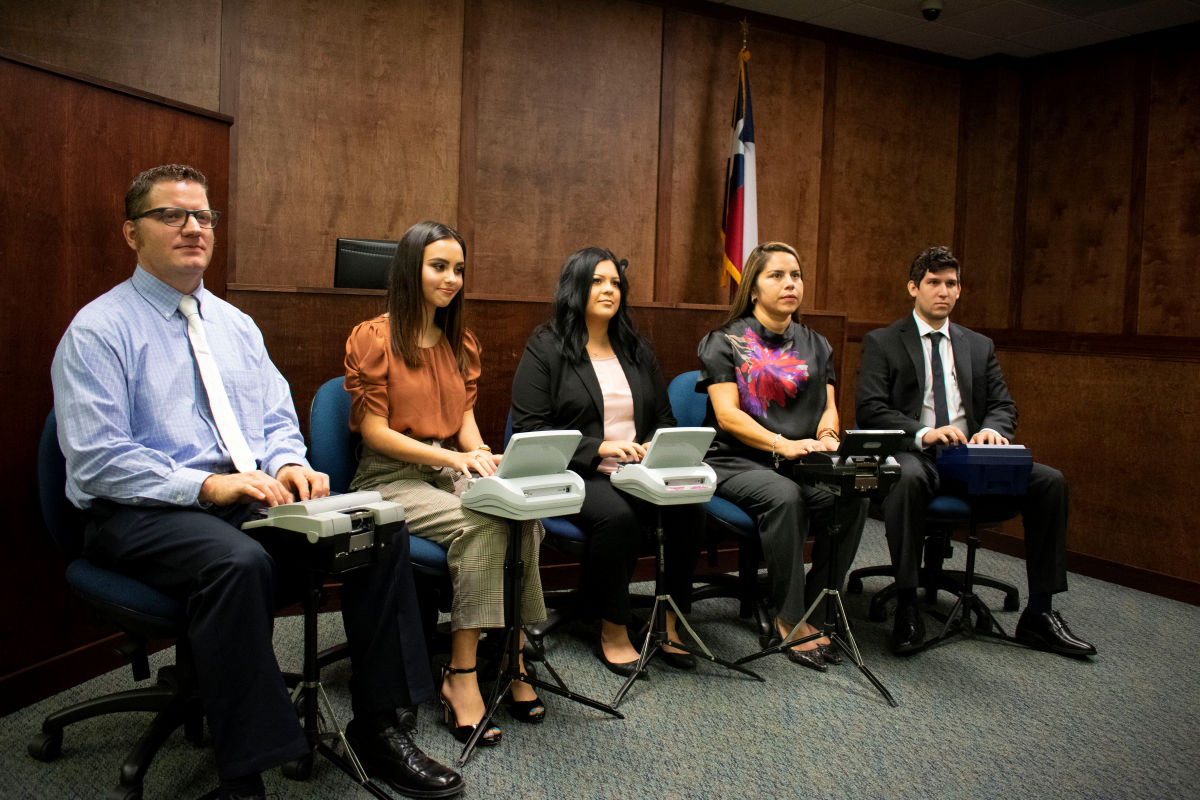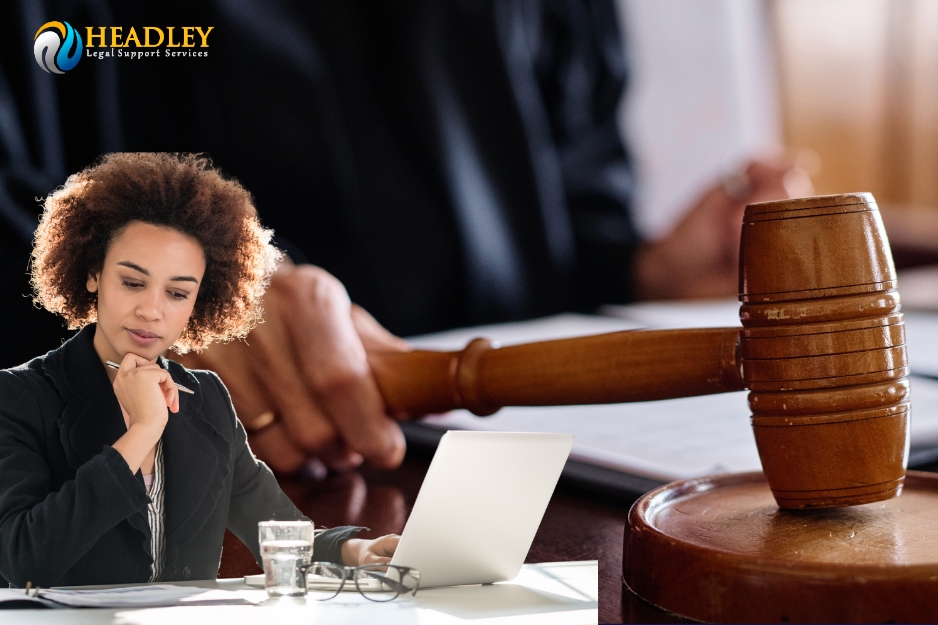10 reasons why durham court reporting is vital for modern law firms
All Concerning Court Reporting: Crucial Insights Into Its Relevance in Legislation
Court reporting offers a crucial function within the lawful framework, providing a exact and trusted record of proceedings. With advanced methods and devices, court press reporters catch the subtleties of testimonies and legal discussion. The value of their job prolongs past plain transcription. As the lawful landscape progresses, so as well does the role of modern technology in court reporting. Understanding these dynamics discloses much deeper ramifications for justice and transparency in the lawful system.
The Role of Court Reporters in the Legal System

Commonly neglected, court reporters play a necessary duty in the lawful system by making certain a verbatim and exact document of procedures. Their key duty entails recording talked words during trials, depositions, and other lawful occasions, which offers as an official record for future referral. This documents is essential for allures, as it gives the essential information for examining decisions made by juries and courts.
Court press reporters need to possess phenomenal listening abilities and a deep understanding of lawful terminology to catch the subtleties of testament and argumentation properly. Their job adds to transparency within the judicial process, enabling liability and fairness. In addition, they promote accessibility to justice by making records readily available to included events, ensuring that everybody has the possibility to evaluate the procedures. By doing this, court press reporters copyright the integrity of the legal system, reinforcing the significance of accurate communication in issues of legislation.
Strategies and Devices Used in Court Reporting
In court reporting, various strategies and devices enhance the accuracy and effectiveness of transcription. Stenography innovation plays a significant function, enabling reporters to capture talked words promptly, while electronic recording approaches supply different remedies for paperwork. Comprehending these tools is essential for grasping exactly how court reporters fulfill their crucial function in the lawful system.
Stenography Modern Technology Review
Stenography innovation functions as the foundation of modern-day court reporting, making it possible for specific and effective transcription of talked dialogue. Utilizing specialized devices referred to as stenographs, court press reporters can catch speech at remarkable rates, commonly exceeding 200 words per minute. These makers utilize an unique key-board layout that enables numerous keys to be pressed simultaneously, developing phonetic representations of words - durham court reporting. This technique decreases the requirement for extensive spelling and improves transcription accuracy. Furthermore, clerks use various shorthand techniques and icons to additional streamline the procedure, ensuring that no detail is forgotten during procedures. The integration of stenography modern technology not only cultivates efficient interaction in legal settings yet also maintains the integrity of the judicial procedure by providing precise and dependable documents of discussions
Digital Recording Methods
A boosting number of court reporting experts are transforming to digital recording methods to enhance the accuracy and performance of their transcriptions. These techniques use sophisticated sound and video innovation to capture proceedings in real-time. Digital recorders, typically paired with high-grade microphones, assure that every word spoken is protected with quality. Specialized software application can transcribe audio files immediately, allowing for quicker turnaround times. Some specialists include twin recording systems for redundancy, ensuring no vital details is lost. Additionally, electronic recordings can be conveniently indexed and browsed, assisting in speedy access of specific sectors. As legal atmospheres evolve, accepting these digital tools not just streamlines the reporting procedure but also preserves the integrity of the document.
The Value of Precision in Transcription
Accuracy in transcription is essential in court reporting, as it assures that legal records show the true content of process. This accuracy can substantially influence case end results, influencing the choices made by judges and juries. Maintaining high standards of precision is vital in the legal profession.

Precision in Lawful Records
Although the lawful system relies heavily on significant disagreements and influential rhetoric, real foundation of judicial proceedings lies in the precision of legal records. Accurate transcription is important, as it guarantees that every ruling, statement, and inquiry is recorded appropriately. Such accuracy serves numerous purposes, including providing a reputable referral for charm procedures and keeping the integrity of the judicial system. Mistakes in transcription can cause misconceptions, misconceptions, and possibly damaging effects for all celebrations entailed. Subsequently, stenotype reporter should possess extraordinary abilities and focus to detail, as their job directly affects the clarity of lawful papers. Eventually, the precision of legal documents underpins the count on put in the judicial procedure, enhancing the value great site of careful transcription.

Influence on Case Outcomes
When lawful proceedings unfold, the accuracy of transcription commonly dictates the trajectory of a situation's outcome. Exact court reporting guarantees that every word spoken is effectively caught, enabling attorneys, juries, and courts to make enlightened decisions based upon the document. Mistakes in transcription can lead to misconceptions, misconceptions, and possibly unfair judgments. The integrity of lawful files relies greatly on the accuracy of these records, as they work as the structure for charms and more lawsuits. In high-stakes instances, where the effects are extensive, the duty of a court reporter becomes much more crucial. Preserving rigorous criteria in transcription not just supports the legal process yet also maintains the concepts of justice and fairness in the courtroom.
Court Reporting in Various Legal Setups
Court reporting plays an essential duty across numerous legal setups, ensuring that process are accurately recorded for future referral. In criminal court, court reporters record statements, proof, and judicial rulings, which are important for appeals and instance reviews. In civil lawsuits, accurate records assist in the discovery procedure and supply a trusted document for trial process. Management hearings typically depend on court reporters to preserve a main record, guaranteeing openness and responsibility in governmental processes. Family members courts additionally benefit from court reporting, as exact documents of process can affect safekeeping choices and negotiations. In addition, depositions in pre-trial stages require accurate recordings to capture the nuances of witness testaments, which might be significant in shaping situation techniques. Generally, court reporting works as a keystone in the legal system, cultivating justness and clearness across varied judicial settings.
The Impact of Innovation on Court Reporting
As technology proceeds to evolve, its influence on court reporting has come to be progressively considerable. Innovations such as digital recording, real-time transcription software program, and expert system have changed typical techniques. Digital audio recorders now record court proceedings with amazing quality, permitting stenotype reporter to concentrate on nuances and context instead than solely on keying. Real-time transcription modern technologies allow prompt access to records, promoting efficiency and boosting collaboration amongst lawyers. Furthermore, expert system tools are being incorporated to aid in the transcription process, reducing human mistake and quickening file generation. In spite of these improvements, the vital abilities of stenotype reporter remain very useful, as they offer a nuanced understanding of lawful language and courtroom characteristics. Inevitably, modern technology matches as opposed to changes the expertise of stenotype reporter, ensuring that the honesty and accuracy of lawful documentation are promoted in an increasingly digital landscape.
Occupation Opportunities and Pathways in Court Reporting
The evolution of technology in court reporting has actually opened up a range of job chances for striving professionals in the field. Commonly, stenotype reporter were largely accountable for transcribing lawful process. Improvements such as electronic recording and real-time reporting have broadened their functions.
Today, court press reporters can focus on locations such as captioning for television broadcasts, supplying transcription solutions for lawful companies, and functioning in the company sector for meetings or depositions - durham court reporting. In addition, possibilities in remote reporting, particularly due to the surge of virtual courtrooms, have actually ended up being significantly prevalent
Educational paths include official training programs, accreditation courses, and proceeding education and learning to stay upgraded with technical modifications. Networking within lawful and expert organizations likewise plays a substantial duty in job innovation. In general, the diverse opportunities in court reporting reflect the vibrant nature of the legal profession and the boosting demand for experienced professionals.
The Future of Court Reporting in an Evolving Legal Landscape
Just how will the function of court reporting adjust as the legal landscape proceeds to evolve? As technology advancements, court reporting is most likely to embrace ingenious devices such as artificial knowledge and real-time transcription software. These advancements might boost precision and efficiency in capturing legal process. Additionally, the enhancing prevalence of remote hearings demands that court reporters become experienced in electronic platforms, making certain seamless paperwork regardless of location.
Simultaneously, court reporters will need to adjust their skills to take care of brand-new sorts of instances, such as those entailing cyber legislation and intellectual property disagreements, which require specialized expertise. In addition, the demand for immediate accessibility to transcripts will certainly press professionals to deliver quicker turnaround times without endangering high quality. Eventually, the future of court reporting will certainly depend upon an equilibrium between typical abilities and technological integration, ensuring that the integrity of the legal procedure continues to be intact in an increasingly digital globe.
Often Asked Inquiries
How Do Stenotype Reporter Handle Sensitive Information Throughout Process?

What Qualifications Are Required to Come To Be a Court Reporter?
To come to be a court press reporter, people usually need a senior high school diploma, specialized training from a certified program, proficiency in shorthand or voice writing, and accreditation or licensure, depending on state needs and laws.
Are Court Reporters Required to Have a Certificate?
Stenotype reporter are typically needed to obtain a certificate, depending on the territory. Licensing assurances that they satisfy specific criteria of effectiveness and expertise, which is necessary for keeping the stability of legal procedures.
How Do Court Press Reporters Take Care Of Different Accents and Languages?
Stenotype reporter manage various accents and languages with comprehensive training, technique, and familiarity with helpful resources various speech patterns. They frequently make use of specialized software and methods to precisely catch spoken words, making sure clearness and precision in their transcripts.
What Is the Ordinary Income for a Stenotype Reporter?
The typical wage for a court reporter varies by place and experience, usually ranging from $50,000 to $80,000 each year. In high-demand areas, incomes can go beyond $100,000, mirroring the career's value and specialized skills.
Commonly forgotten, court reporters play a necessary role in the legal system by making sure a verbatim and exact record of proceedings. In criminal court, court reporters transcribe testimonies, evidence, and judicial rulings, which are crucial for charms and case testimonials. Household courts additionally profit from court reporting, as accurate paperwork of procedures can affect protection decisions and settlements. Typically, court press reporters were mostly liable for transcribing lawful procedures. Today, court press reporters can specialize in locations such as captioning for tv programs, providing transcription services for legal firms, and functioning in the company sector for depositions or meetings.